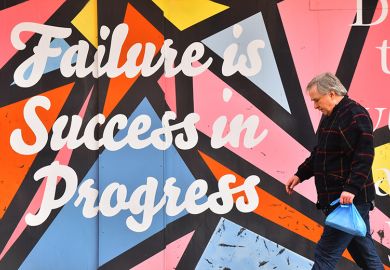Business schools should “strip out” parts of their curriculum that can be learned on YouTube to make way for content that properly engages with the fast-changing nature of the world and its challenges, according to a British peer.
Climate change mitigation strategies, how to integrate migrants into the operational economy and a greater understanding of mental health should become front and centre of what students are taught, said Lord Hastings of Scarisbrick, a professor of leadership at Utah State University’s Jon M. Huntsman School of Business and chair of the board of trustees at SOAS University of London.
He told the annual conference of the Chartered Association of Business Schools that when he was chancellor of Regent’s University London, they had conducted what he called an “honest YouTube assessment” to see what their students could learn for free and then adapted the curriculum accordingly.
“The world has changed so radically; you can almost get an MBA off TikTok or at least pick up some interesting strands of thought there,” he added.
Lord Hastings said schools should therefore “strip out historically un-useful or cluttering parts of the curriculum which can be gained elsewhere”.
Appearing on the same panel, Juergen Maier, a former chief executive of Siemens UK and now a visiting professor at the University of Manchester, said business schools should train students “to be able to communicate in areas that are outside the traditional comfort zone of leaders”.
This could be speaking about LGBT or non-binary issues, Mr Maier said, or the “deep understanding of the societal impact your business has”.
He said these issues had increasingly come up during his last years at Siemens, and “it was often a bit awkward because people in the boardroom didn’t have the language, didn’t have the experience, to be able to discuss those issues and put the right measures, projects or activities in place to make sure these things are really supported in your organisation”.
Baroness Wolf of Dulwich, professor of public sector management at King’s College London, said business schools should not forget the “enduring day-to-day challenges” in their rush to get students to engage with challenges such as climate change.
She said while most students will start business courses with a view to going into the private sector, a majority will find themselves in the public sector, where “leadership is a very real challenge”.
Schools should equip them with the skills to tackle problems such as “how do you create a team when half of the people you are working with are in east Asia and you’ve never met them” or how to keep colleagues on board as a leader when there is pressure to cut costs.
These challenges are “just as real as they ever were”, Lady Wolf said, and as “critical” as pressing the importance of climate change or the limitations of the free market model.
Register to continue
Why register?
- Registration is free and only takes a moment
- Once registered, you can read 3 articles a month
- Sign up for our newsletter
Subscribe
Or subscribe for unlimited access to:
- Unlimited access to news, views, insights & reviews
- Digital editions
- Digital access to THE’s university and college rankings analysis
Already registered or a current subscriber?








